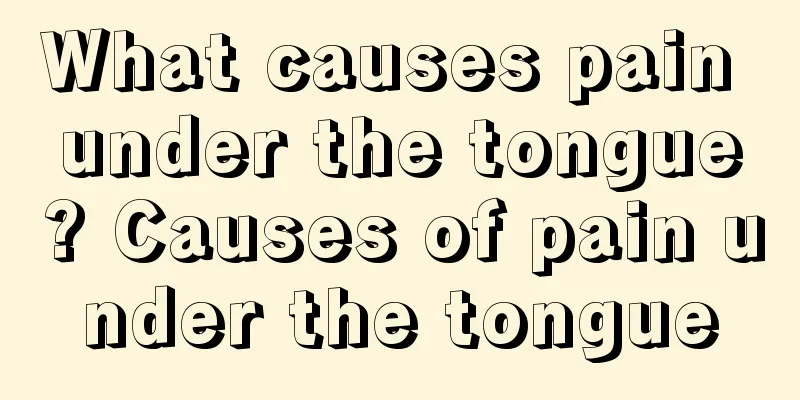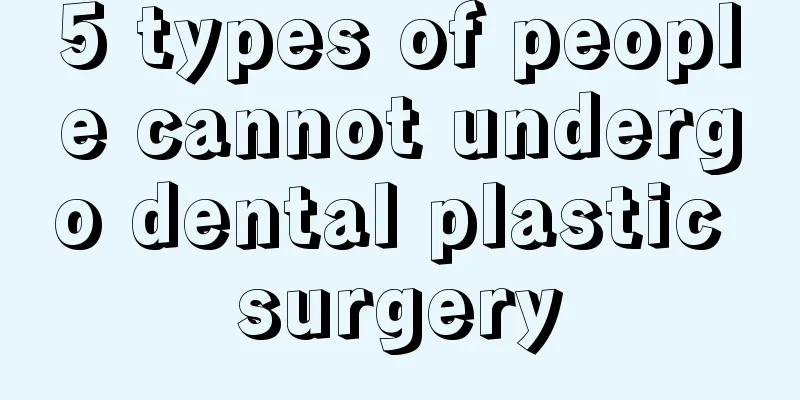What causes pain under the tongue? Causes of pain under the tongue

|
What causes pain under the tongue? When suffering from tongue pain, many people do not care, thinking it is not a serious illness. In fact, if the pain occurs frequently, it is the body's reminder that you may have glossitis. Glossitis is not uncommon in life. Its main cause is not paying attention to oral hygiene. What causes pain under the tongue? 1. Mechanical factors: According to the duration of stimulation, they can be divided into persistent and non-persistent stimulation factors. Persistent stimulation includes: friction between residual crowns and roots of teeth and the tongue and oral mucosa leading to glossitis; non-persistent stimulation includes: glossitis caused by hard food, tooth bites, improper brushing force, etc. 2. Physical factors: Thermal damage to the oral mucosa is not common. It can be caused by overly hot drinks, tea or food. Whole-body or face radiation exposure exceeding a certain dose can cause damage to the whole body and oral tissues, resulting in acute radiation sickness or radiation glossitis. If it is glossitis, what are the symptoms of glossitis? 1. In the early stage of glossitis, there are small smooth spots on the tongue. When glossitis first occurs, there are several smooth, red glaze-like spots on the tongue, or most of the tongue surface is beef-like, purple-red and smooth. These lesions or normal tongue surface are often accompanied by superficial ulcers or recurrent follicular glossitis. 2. Numbness and burning pain. Generally, glossitis is more likely to occur in the front part of the tongue, especially the tip and edge of the tongue. If you suffer from glossitis, you may experience symptoms such as numbness, burning pain, and tingling when eating. The course of the disease tends to be prolonged, with symptoms varying in severity. 3. There are shallow fissures on the tongue. The filiform papillae on the tongue atrophy, become thinner or disappear, so the tongue surface appears fiery red and has shallow fissures. Glossitis with atrophy is often a prominent symptom in critically ill patients. 4. Erosion and cracking at the corners of the mouth. If glossitis is accompanied by erosion and cracking of the corners of the mouth or red, dry and flaky lips, it indicates riboflavin deficiency. |
<<: What should I do if my eyes hurt when looking at the phone for a long time
>>: What's going on with itchy eyes and swollen eyelids?
Recommend
Influenza A virus antigen negative?
In daily life, influenza A virus is a common infl...
Anti-cancer fruits, 8 kinds of fruits should be eaten regularly
More and more people are suffering from cancer. T...
What are the causative factors of lung cancer? Four reasons can lead to the occurrence of lung cancer
Lung cancer is the most common malignant tumor at...
What are the symptoms of skin cancer
In recent years, skin cancer has become one of th...
What are the good methods of TCM to treat lung cancer? A complete collection of TCM remedies for treating lung cancer
Traditional Chinese medicine treats both the symp...
Residual chlorine in tap water increases the probability of bladder cancer. The correct way to prevent bladder cancer
If you want to know why residual chlorine in tap ...
Will the thread-embedded bumps disappear on their own?
It is girls’ nature to love beauty, and as cosmet...
How to effectively care for laryngeal cancer
In recent years, laryngeal cancer has become one ...
Is glaucoma hereditary? Parents must know this
Glaucoma is a relatively common disease in life. ...
What are the benefits of adding vinegar to shampoo
Vinegar is an indispensable condiment in our dail...
Is broken palm hereditary?
Many people may have genetic diseases. Some are i...
Can brain cancer cause nose bleeding?
Generally speaking, some brain tumor patients wil...
How to Cover Gray Hair
Some people don't want to dye their hair when...
Will using a face brush make your pores bigger?
Skin cleansing is the most important part of dail...
What are the causes of nasopharyngeal cancer
The causes of nasopharyngeal carcinoma are relate...









